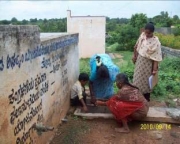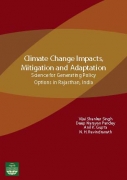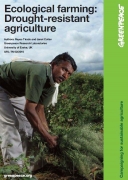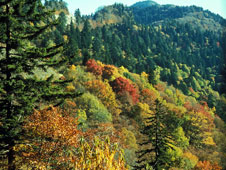Climate and Weather
Rainfed areas and rice farming Crucial agricultural water issues
Posted on 25 Dec, 2010 08:30 PMJohn Thompson works on power, policy and sustainability issues in food and agriculture, water resource management and rural development. He is a STEPS Centre member, IDS Fellow and joint Co-ordinator of the Future Agricultures Consortium. He presents two crucial agricultural water issues to take priority on World Water Day.
Cancun: Is it a climate meet with a difference?
Posted on 25 Dec, 2010 07:58 PMDespite the pre-Cancun Wikileaks revelation of U.S. strong-arm tactics at the Copenhagen summit, and U.S. climate envoy Todd Stern's remarks about "climate bribery", wherein he said countries asking for aid were in no position to accuse the U.S. of bribery; it is largely perceived that the Cancun Climate Meet has picked up the lost momentum of Copenhagen.
193 nations met at Cancun to debate on how to move forward on the climate change adaptation process and drafted the Cancun Agreement.
Saving rice - Ambitious plans to increase productivity
Posted on 24 Dec, 2010 10:13 AMEnormous funds are being poured into research aimed at improving seed varieties, with a heavy focus on developing hybrid rice. Is it the right option for millions of small rice farmers who are already battling high input costs and increasingly unpredictable weather? Or does part of the solution lie in efficient methods of cultivation that will cut down water use and improve yield?
Film Festival on "Green Unplugged"
Posted on 23 Dec, 2010 12:05 PMContent and Image Courtesy: Culture Unplugged
Culture Unplugged Studios will be launching ‘Green Unplugged’ - the festival where we unite to explore the nature, that flows without & within us. This festival aspires to contemplate on the environment and the need to co-create future generation with love & respect for mother earth. It aspires to overlap the sound of our cry today with that of nature and hopes to collectively perceive a new path. We invite your conscious films that may help us all wake to our holistic future - an integral individual & human community thriving in co-existence with nature. With your co-operation, the festival hopes to bring context to our existence and reveal the evolving divine - the truth of life, hidden in nature‘s dream of tomorrow.
Benefits, issues and status of WATSAN systems - A survey of an IDWM project supported by Arghyam
Posted on 22 Dec, 2010 07:56 PM This paper presents the results of a survey of WATSAN systems implemented under an Integrated Domestic Water Management (IDWM) project supported by Arghyam and implemented by MYRADA and MYKAPS in Bangarpet and H D Kote blocks of Kolar district of Karnataka. Arghyam has promoted Roof-top Rain Water Harvesting (RRWH) and eco-sanitation systems in its various project areas through its partner organizations.
This paper presents the results of a survey of WATSAN systems implemented under an Integrated Domestic Water Management (IDWM) project supported by Arghyam and implemented by MYRADA and MYKAPS in Bangarpet and H D Kote blocks of Kolar district of Karnataka. Arghyam has promoted Roof-top Rain Water Harvesting (RRWH) and eco-sanitation systems in its various project areas through its partner organizations.
This project aimed at developing an integrated approach to domestic water management. It focused on construction of RRWH and eco-sanitation toilets in four villages in the project area in Kolar with the aim of creating models of integrated management of domestic water and sanitation in a rural set-up.
Seminar on Indian Northeast Monsoon - Recent Advances and Evolving Concepts (INEMREC) - 2011, Chennai
Posted on 22 Dec, 2010 05:16 PMOrganizers:
Climate change impacts, mitigation and adaptation - Science for generating policy options in Rajasthan
Posted on 20 Dec, 2010 09:14 PM This paper by Rajasthan Pollution Control Board on climate change impacts in the context of Rajasthan seeks to address the issue of need of the society for robust knowledge to pursue strategies for mitigation as well as adaptation in order to address the challenges associated with global warming and climate change.
This paper by Rajasthan Pollution Control Board on climate change impacts in the context of Rajasthan seeks to address the issue of need of the society for robust knowledge to pursue strategies for mitigation as well as adaptation in order to address the challenges associated with global warming and climate change.
Accordingly, here a brief review of the available literature and an annotated bibliography of published research on climate change impacts, mitigation and adaptation in order to facilitate the identification of policy options in Rajasthan is provided.
Also included is the literature on how human societies contribute to environmental change and how, in turn, become vulnerable to these changes. It also explores the available knowledge on how likely ecosystem goods and services are impacted to climatic oscillations (environmental sensitivity) and the ability of rural communities to cope (social resilience) with those changes.
Ecological farming: Drought resistant agriculture – A paper by Greenpeace
Posted on 20 Dec, 2010 08:09 PM This paper by Greenpeace on ecological farming illustrates proven, modern farming approaches that help cope with drought. It elaborates on the drought-resistant crop varieties and calls for policy makers to increase funds for research on the system.
This paper by Greenpeace on ecological farming illustrates proven, modern farming approaches that help cope with drought. It elaborates on the drought-resistant crop varieties and calls for policy makers to increase funds for research on the system.
Human-induced climate change is resulting in less and more erratic rainfall, especially in regions where food security is very low. The poor in rural and dry areas will suffer the most and will require cheap and accessible strategies to adapt to erratic weather. This adaptation will need to take into account not only less water and droughts, but also the increased chance of extreme events like floods.
Biodiversity and a healthy soil are central to ecological approaches to making farming more drought-resistant and more resilient to extreme events. Practices that make soils better able to hold soil moisture and reduce erosion and that increase biodiversity in the system help in making farm production and income more resilient and stable.
Greener climate prediction by NASA shows plants slow warming
Posted on 20 Dec, 2010 06:01 PMArticle and Image Courtesy: NASA
A new NASA computer modeling effort has found that additional growth of plants and trees in a world with doubled atmospheric carbon dioxide levels would create a new negative feedback – a cooling effect – in the Earth's climate system that could work to reduce future global warming.
 A new NASA modeling effort found that in a doubled-carbon dioxide world plant growth could lessen global warming by about 0.3 degrees C globally. The same model found that the world would warm by 1.94 degrees C without this cooling feedback factored in. Image: Great Smoky Mountains National Park; Credit: National Park Service
A new NASA modeling effort found that in a doubled-carbon dioxide world plant growth could lessen global warming by about 0.3 degrees C globally. The same model found that the world would warm by 1.94 degrees C without this cooling feedback factored in. Image: Great Smoky Mountains National Park; Credit: National Park Service
Global warming mapped: Updates from Earth Observatory
Posted on 20 Dec, 2010 05:44 PMArticle Courtesy: Earth Observatory
Image Courtesy: NASA
The world is getting warmer. Whether the cause is human activity or natural variability, thermometer readings all around the world have risen steadily since the beginning of the Industrial Revolution.





